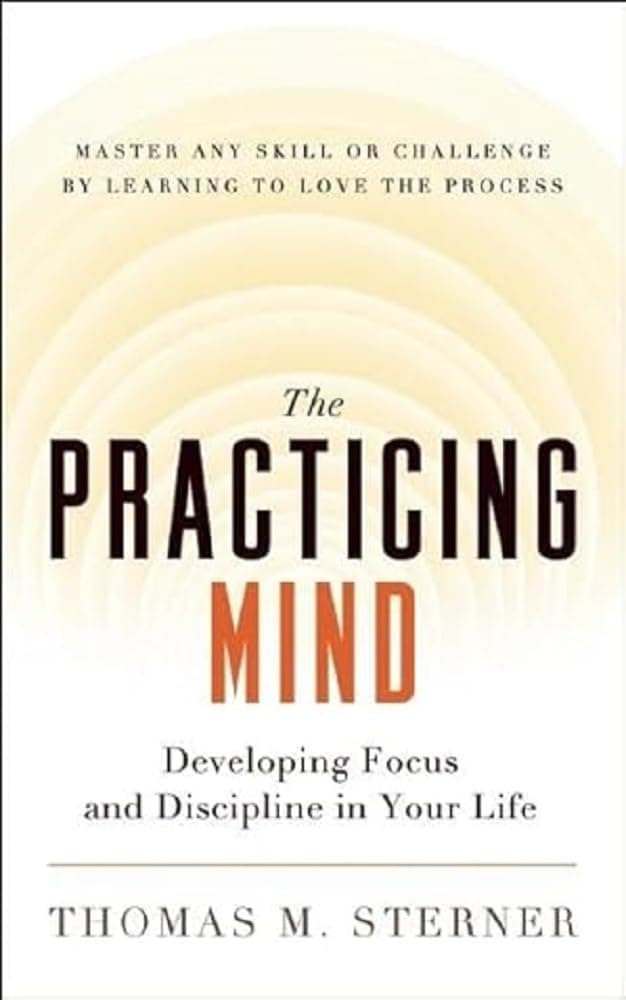
The Practicing Mind
By: Thomas Sterner
Category: Learning
Finished:
Highlights
We miss the point that the ability to develop any skill as swiftly as possible, with the least amount of effort, and even to experience inner peace and joy in the process, is in fact a skill itself, and one that requires constant practice to become an effortless part of who we are.
When we subtly shift toward both focusing on and finding joy in the process of achieving instead of having the goal, we have gained a new skill. And once mastered, it is magical and incredibly empowering.
However, the practicing mind is quiet. It lives in the present and has laser-like, pinpoint focus and accuracy. It obeys our precise directions, and all our energy moves through it. Because of this, we are calm and completely free of anxiety. We are where we should be at that moment, doing what we should be doing and completely aware of what we are experiencing. There is no wasted motion, physically or mentally.
If you are not in control of your thoughts, then you are not in control of yourself. Without self-control, you have no real power, regardless of whatever else you accomplish. If you are not aware of the thoughts that you think in each moment, then you are the rider with no reins, with no power over where you are going. You cannot control what you are not aware of. Awareness must come first. (see Art of Learning)
We have a very unhealthy habit of making the product — our intended result — the goal, instead of the process of reaching that goal.
When we practice something, we are involved in the deliberate repetition of a process with the intention of reaching a specific goal. The words deliberate and intention are key here because they define the difference between actively practicing something and passively learning it. (similar to deliberate practice, see Peak).
When you focus on the process, the desired product takes care of itself with fluid ease. When you focus on the product, you immediately begin to fight yourself and experience boredom, restlessness, frustration, and impatience with the process. (See Score Takes Care of Itself)
When you focus your mind on the present moment, on the process of what you are doing right now, you are always where you want to be and where you should be. All your energy goes into what you are doing. However, when you focus your mind on where you want to end up, you are never where you are, and you exhaust your energy with unrelated thoughts instead of putting it into what you are doing.
In summary, creating the practicing mind comes down to a few simple rules:
- Keep yourself process-oriented.
- Stay in the present.
- Make the process the goal and use the overall goal as a rudder to steer your efforts.
- Be deliberate, have an intention about what you want to accomplish, and remain aware of that intention.
When you remain aware of your intention to stay focused on the present, it’s easy to notice when you fall out of this perspective. At such times you immediately begin to judge what and how well you are doing, and you experience impatience and boredom. When you catch yourself in these moments, just gently remind yourself that you have fallen out of the present, and feel good about the fact that you are now aware enough to recognize it. You have begun to develop the Observer within you, who will prove so important in your self-guidance.
If, however, you begin to analyze your progress based on how you play in relation to the soloist’s performance (something that is usually done unconsciously), you are headed for discontentment and may even become so frustrated that you give up on your efforts.
We consciously or unconsciously pick a point of reference in whatever we do and decide that nothing will be right until we get to that point. If you step back and observe your internal dialogue from time to time during the day, you will be amazed at how hard you work against yourself with this type of thinking.
In Zen, this state is referred to as “beginner’s mind.” When you are a beginner in any activity, accomplishing it takes all your concentration, and your mind is empty of chatter. (see Zen Mind Beginner’s Mind).
What is required is that you are aware of what you want to achieve, that you know the motions you must intentionally repeat to accomplish the goal, and that you execute your actions without emotions or judgments; just stay on course. (See Power of Habit)

